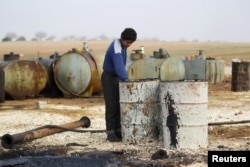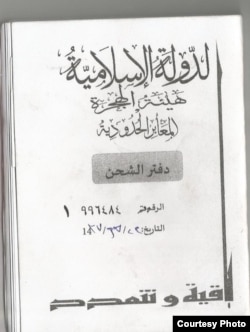Efforts to hack away at the Islamic State terror group's wealth are making good progress but are not yet close to crippling its finances, according a senior U.S. treasury official.
"ISIL is suffering financially and it's due in large part to the efforts we in the coalition have been taking," Assistant Treasury Secretary Daniel Glaser said Wednesday during a talk Tuesday at the Foundation for Defense of Democracies. ISIL is an acronym for Islamic State.
The most notable headway has come against IS's budding oil ventures which, at one point, were bringing in an estimated $500 million a year.
The Treasury Department's Office of Terrorism and Financial Intelligence believes such revenue has now been cut in half — to about $250 million a year — due to coalition airstrikes, counter-smuggling efforts and a drop in global oil prices.
‘Stranglehold’ on resources
A U.S. intelligence official, speaking on condition of anonymity, said it is clear Islamic State is "feeling pressure" from persistent strikes against its oil infrastructure, as well as its cash stockpiles in Iraq and Syria, all of which is having a trickle-down effect.
"On multiple dimensions — manpower, new recruits and operating space — ISIL is at its weakest point," the official added, using a line that has been gaining favor in recent weeks.
It is estimated that IS cash reserves alone have been slashed by as much as $300 million to $800 million, as U.S. and coalition partners have increased the tempo of airstrikes aimed at the group’s finances.
U.S. Defense Secretary Ash Carter told the Senate Armed Services Committee late last month that coalition operations were "putting a stranglehold" on IS's financial resources, undermining the group's ability to govern.
No ‘victory lap’ yet
Still, the Treasury Department's Glaser warned there is ample reason to be cautious.
"They still have a considerable amount of money," he said. "I'm certainly not trying to do a victory lap."
Officials also believe more still needs to be done to ensure IS is cut off from both the Iraqi and global financial systems. And they say financial activity in cities near IS-controlled areas, like Kirkuk, may also need to be subjected to closer scrutiny.
Another key obstacle is that for all the damage dished out by the U.S. and its coalition partners, IS retains an ability to generate money from the territory it still controls. Glaser estimates various forms of taxation alone are putting $360 million a year into IS coffers.
"Financially, IS has encountered difficulties but liquidity is still maintained by pragmatic interactions with the outside world," said Aymenn Jawad al-Tamimi, a fellow at the Middle East Forum, who has studied the group's internal workings.
As an example, al-Tamimi cites an IS registry booklet he was able to obtain from a Syrian businessman, which details how freight trucks from rebel-held areas near the Turkish border cross into IS-held territory in the village of Dabiq.
U.S. terror finance officials and analysts worry that as long as such activity continues, it will allow IS to profit, acknowledging that even the vast majority of the group's oil revenue stems from demand within territory it controls.
"It is impossible for the outside world to put a complete stop to that," al-Tamimi said. "This is why, ultimately, any goal to destroy IS financially necessitates foremost the retaking of territory."






